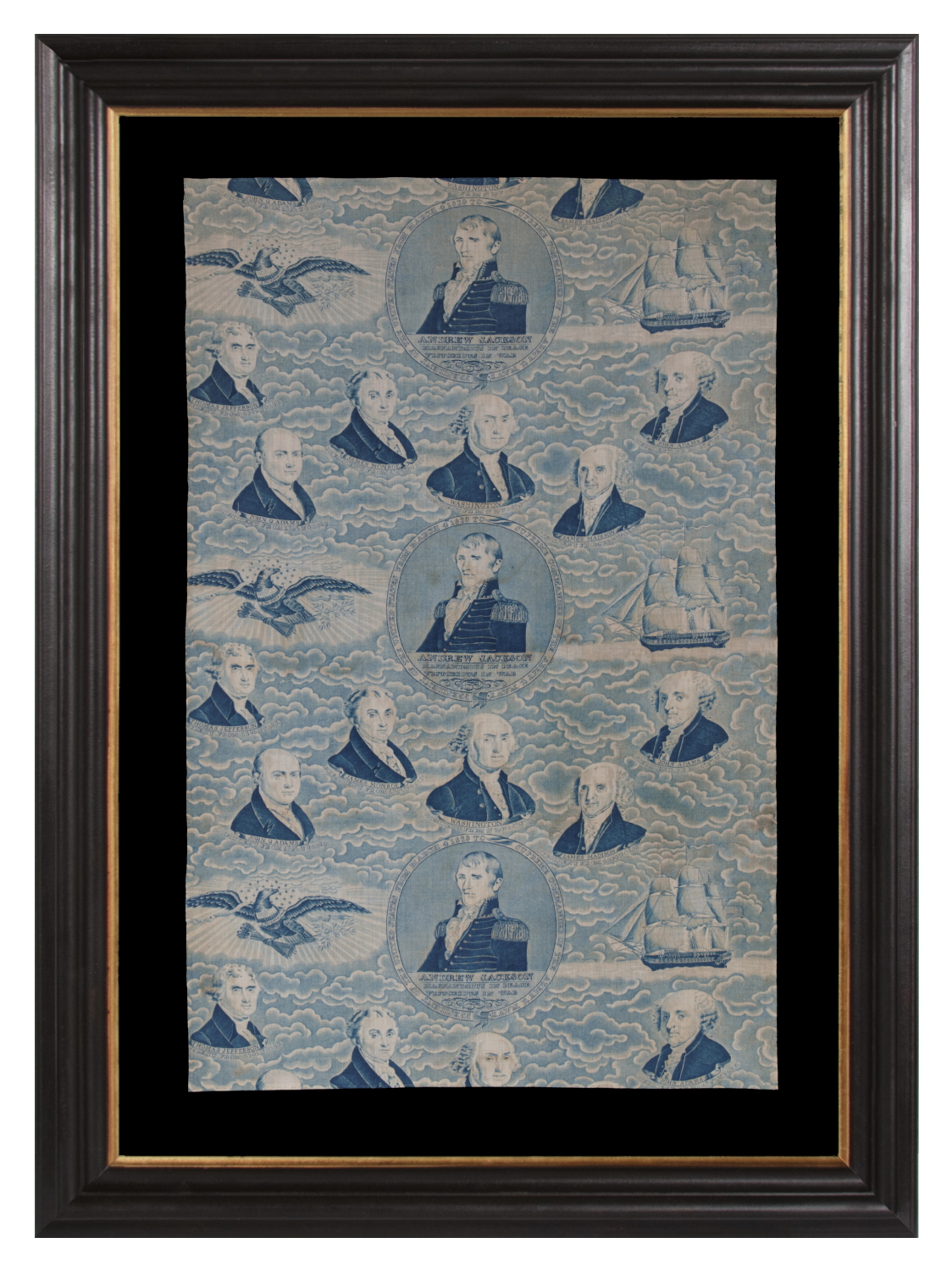
| |
RARE AND EARLY YARD GOODS TEXTILE, MADE FOR THE 1829 INAUGRATION OF ANDREW JACKSON |
| |
|
| Dimensions (inches): |
textile: 25" x 39.5", frame: 31" x 46" x 2.5" |
| Description: |
|
RARE AND EARLY YARD GOODS TEXTILE, MADE FOR THE 1829 INAUGRATION OF ANDREW JACKSON:
This French-made textile, roller-printed on cotton, was made for the American market in 1828 OR 1829, to celebrate the 1829 inauguration of Andrew Jackson as the seventh president of the United States. A similar textile, produced in 1827, bore the same eagle (minus the underlying text), accompanied by very similar images of John Adams, Thomas Jefferson, James Madison, James Monroe, and John Quincy Adams. These are seen on both examples on the same cloud-covered, vibrant, sky blue background.
The portrait of Jackson in military garb was added to the 1829 version in a center medallion, oval in shape. An image of the U.S.S. Constitution was also added. Under Jackson's image is the following text:
Andrew Jackson
Magnanimous in Peace
Victorious in War
And surrounding it can be read:
President of the United States from
March 4 1829 to [left blank]
Supreme commander of the Army & Navy
This is an impressive, early example among textiles with American political imagery. It was taken from a summer quilt which was made in the period but later disassembled.
Brief Biography of Andrew Jackson:
Born in the backwoods of the Carolinas in 1767, Andrew Jackson is probably most famous for his military prowess, specifically that shown in his victory at the Battle of New Orleans during the War of 1812. Jackson received minimal education, but studied law and grasped it enough to become a formidable attorney in Tennessee, where he became the state's first representative to the United States Congress, followed by a short stint in the Senate. Jackson ran unsuccessfully for President against John Quincy Adams, Henry Clay, and William Crawford in 1824, winning the popular vote but losing to Adams in the electoral vote. He beat the incumbent Adams in 1828, after which he tried to eliminate the Electoral College, for rather obvious reasons. This was landmark year for American party politics. Jackson's atypical views on certain issues, such as the manner in which Federal offices were chosen, led to a rather firm split between two factions, those who followed "Old Hickory", as he was so nicknamed, and those who opposed him. Thus emerged the Democratic Party under Jackson and the National Republican or "Whig" Party who held against him and what became known as "Jacksonian" politics.
Jackson won again in 1832 and was succeeded by his good friend and vice president, Martin Van Buren, in 1836.
Mounting: The textile has been hand-stitched on all for sides to 100% cotton. It was then affixed to a wooden strainer, covered with an acid-free supportive background. The mount was then placed in a black-painted and hand-gilded, contemporary Italian molding. The front is u.v. protective plexiglas. |
|
|
| |
|
| Primary Color: |
blue |
|
| Earliest Date: |
1829 |
|
| Latest Date: |
1829 |
|
| For Sale Status: |
Sold |
|
| Price |
SOLD |
|
| E-mail: |
info@jeffbridgman.com |
|
 |
|
Page Views:... 1615 |
|


